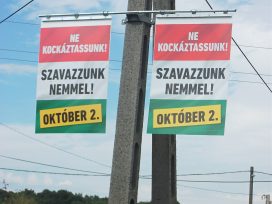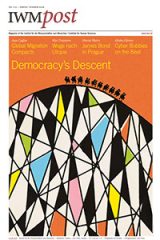

In collaboration with
Institute for Human Sciences
The Institute for Human Sciences / Institut für die Wissenschaften vom Menschen (IWM) is an independent institute for advanced study in the humanities and social sciences. Since its foundation in 1982, it has hosted more than 1500 scholars, journalists and translators from all over the world. Many of the Institute’s Permanent and Visiting Fellows are regular contributors to Eurozine or its focal points The World in Pieces and Ukraine in European Dialogue (see below).
Website: www.iwm.at
Twitter: @IWM_Vienna
Youtube: IWMVienna

Articles

Fidesz’s constitutional counter-revolution has reversed the process of democratization begun in Hungary in 1989. Seeking reasons for Hungary’s ‘backsliding’, Gábor Halmai argues that democratic culture is more crucial than formal legality to guaranteeing rule of law. Hungary challenges the EU’s ability to prevent illiberal democracies emerging in its midst.

If the financial crisis divided the EU between creditors and debtors, opening a gap between North and South, the refugee crisis re-opened the gap between East and West. What we witness today, writes Ivan Krastev, is not what Brussels describes as a lack of solidarity, but a clash of solidarities: national, ethnic and religious solidarity chafing against our obligations as human beings.
The Firtash octopus
Agents of influence in the West
Dirty money from the East has become a resource for dozens of European structures and politicians. Sergii Leshchenko reports on some of those that are only too happy to open their doors to a Ukrainian oligarch willing to invest millions in cleaning up his image.

It is no longer possible to contrast a “secular” West with a “religious” East, writes Olivier Roy. Secularization and the de-culturation of religion are taking place in both East and West. The difference is the political forms that the de-culturated religions take.
Focal points

Inspired by a lecture that Clifford Geertz delivered in 1995 at the Institute for Human Sciences in Vienna, this focal point engages with ‘deep diversity’, ‘a sense of dispersion, of particularity, of complexity and of uncenteredness’ rather than unified world order. It follows the launch of a research programme of the same name at the institute in January 2023.

Post-revolutionary Ukrainian society displays a unique mix of hope, enthusiasm, social creativity, collective trauma of war, radicalism and disillusionment. With the Maidan becoming history, the focal point ‘Ukraine in European Dialogue’ explores the new challenges facing the young democracy, its place in Europe, and the lessons it might offer for the future of the European project.
Projects and publications

